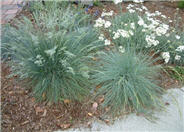
Common name:Blue Fescue
Botanical name:Festuca glauca
This ground cover/grass will grow less than 1' tall and has small, blue green leaves.

Common name:Little Bunny Fountain Grass
Botanical name:Pennisetum alopecuroides 'Little Bunny'
This perennial grass will grow 1.5' tall and 1.5' wide. It has bright green foliage with pinkish flowers that bloom in summer and fall.

Common name:Black Sage
Botanical name:Salvia mellifera
This woody shrub has fragrant, dark green leaves with blue, white, or lilac flowers that bloom in the spring and summer.

Common name:Louis Edmunds Manzanita
Botanical name:Arctostaphylos bakeri 'Louis Edmunds'
This is an upright shrub that grows 6'-8' tall. It is tall with green foliage and pink flowers during the winter and spring.

Common name:Pheasant's Tail Grass
Botanical name:Stipa arundinacea
Pheasant's Tail Grass is a beautiful, fine, airy grass that is emerald green in color. It has many soft yellow, beige flower stalks in the spring. This grass grows 10"-12" tall , 1'-2' wide and is drought tolerant.

Common name:Lavender Cotton
Botanical name:Santolina chamaecyparissus
This ground cover/small shrub will grow to 3' tall and has small, grayish silver leaves with yellow flowers that bloom in the summer.

Common name:Chinese Pistache
Botanical name:Pistacia chinensis
The Pistacia chinensis is a deciduous tree with broad, spreading growth to 50' in height. Its leaves have 10-16 leaflets, and the fall coloring arrives in beautiful shades of red, orange and yellow. The young trees are often gawky, but some become shapely with age.
The Magic of Mulch
In the natural world the endless cycle of birth, growth, decay, death and rebirth flows throughout the seasons. Plants die, leaves fall and new growth springs up in its place. Nothing is lost and the fallen leaves and dead plants decay into the soil, enriching it for the next generation of growth.
Click in the green box for more information
| Designer: | Dry Creek Bed |
Photographer: GardenSoft |
Soils and Compost:
Maintain a two to four inch layer of mulch on the soil surface to reduce weeds, infiltrate rain water, and reduce compaction.
Water Saving Tip:
Integrated Pest Management:
Remove irrigation water and fertilizer from areas where you don't want weeds to grow.

